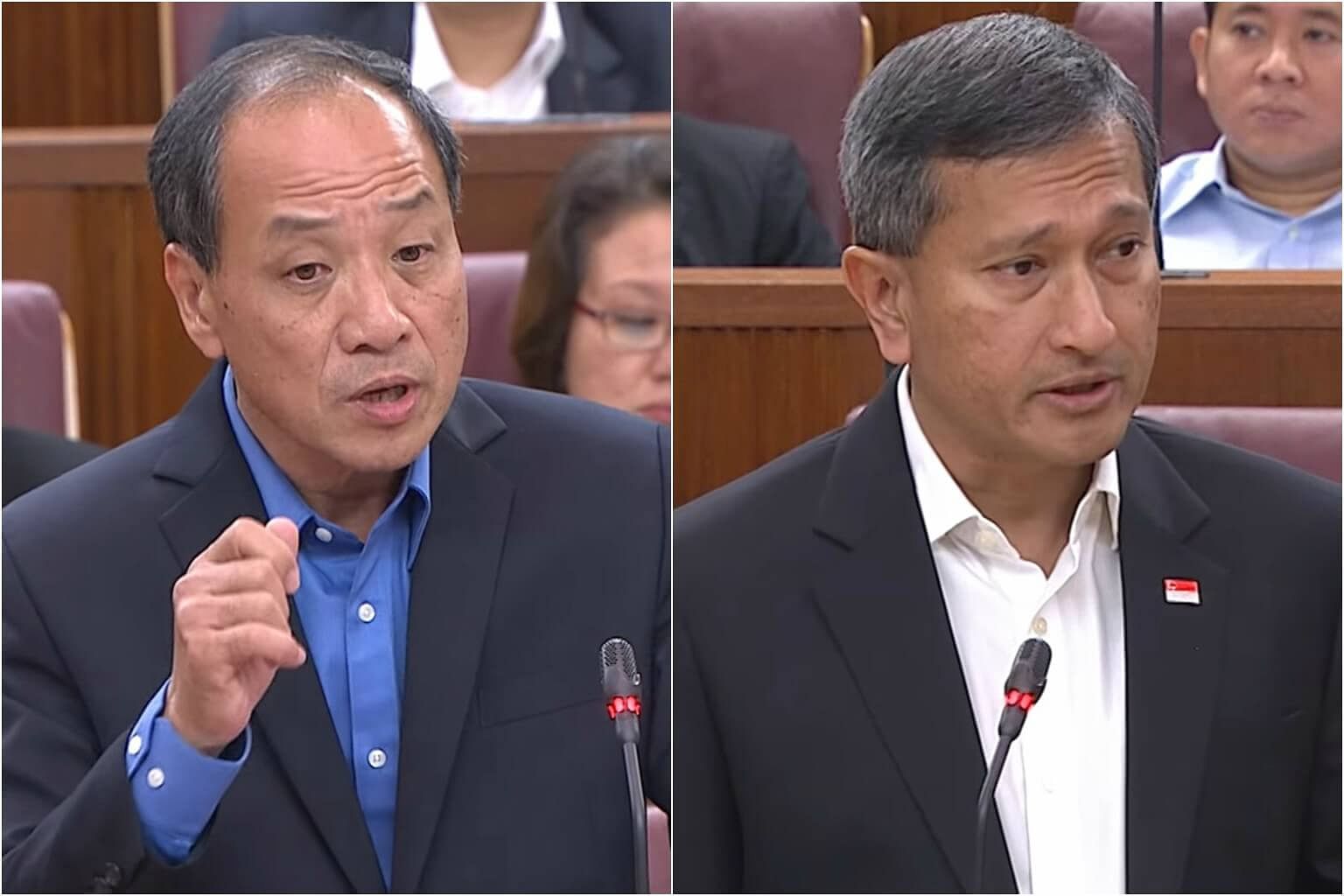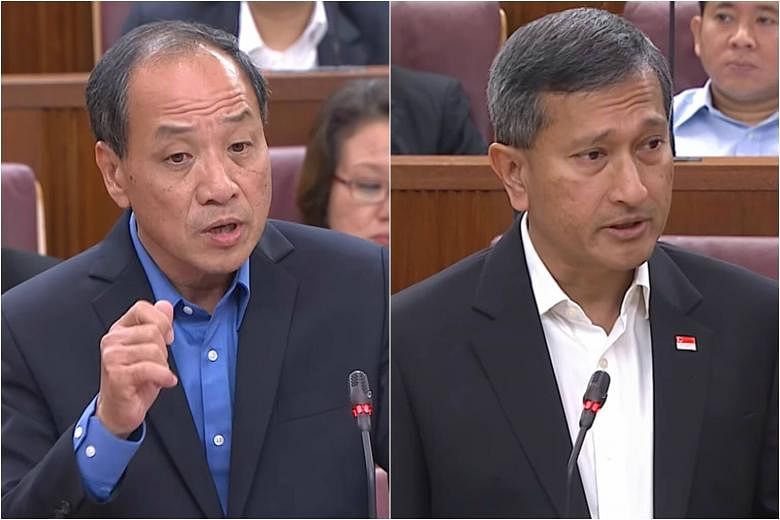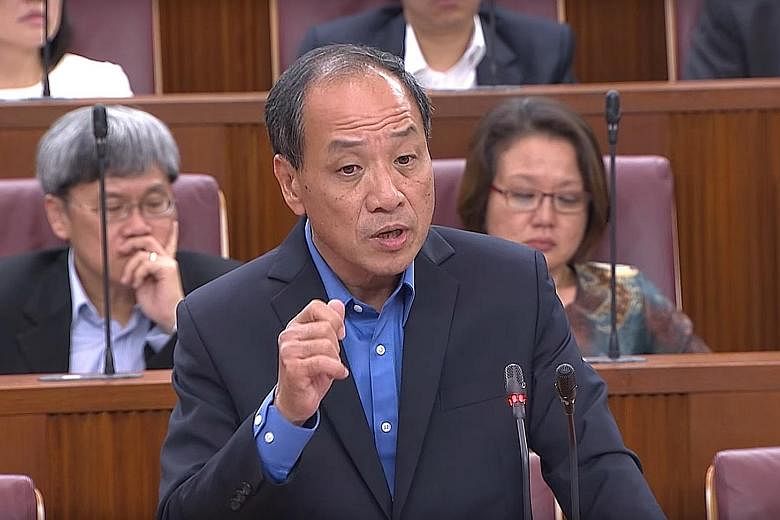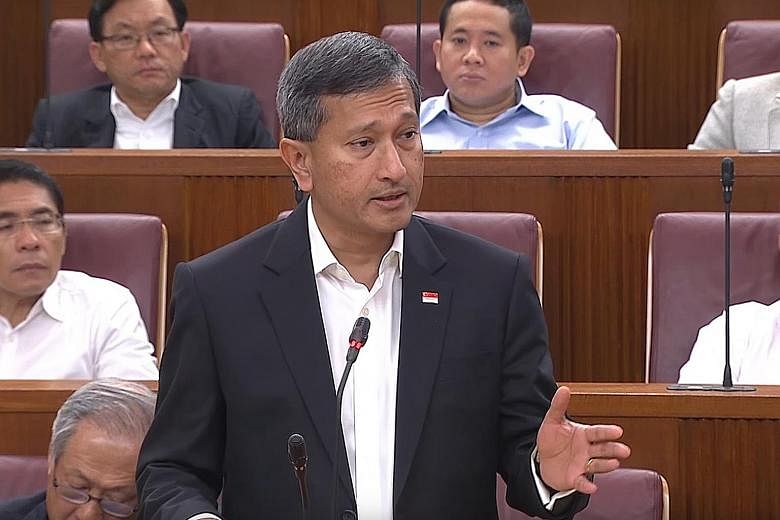MR LOW'S SPEECH: FOREIGN POLICY IN THE NEW WORLD ORDER
It was only half a year ago that the Prime Minister conducted a marathon of diplomatic visits to our closest partners in the region. In three months, he travelled to Laos to meet with Asean leaders, and the United States, China, Japan, India and Australia to affirm longstanding ties.
Things were looking up for our relations with these key countries.
Our principled foreign policy position has emphasised the international rule of law, commitment to an open economy and freedom of navigation, mutual respect for each other's independence, and armed neutrality. This seems to have earned us a good deal of legroom as a small, sovereign city state among large powers. Some have even commented that we are punching above our weight in the international arena to influence outcomes for the common good.
Much of our foreign policy achievements are clearly due to our hard-working diplomatic corps, members of whom have been building on the foundation established by our premier statesman, the late Mr Lee Kuan Yew.
But it is also becoming apparent that the global order is changing. And it is changing rapidly.
Even as the Prime Minister continued his diplomatic marathon, when he was visiting Japan in September, a Chinese state-owned newspaper stoked public anger by accusing Singapore of taking sides against China.

I am glad that the issue of the seizure of the Terrex vehicles by Hong Kong Customs was handled with great care by China and Singapore and has come to pass.
Nevertheless, the public expressions and discussions resulting from the events do point to some critical challenges to Singapore in this changing global order.
The critical challenges pertain to a rising China with the economic and military clout to impose its will on Asia. China may not do so in the near future but, with the means and its strong position on the South China Sea claims, the potential is there.
Whether we like it or not, China is an important strategic partner.
However, even as Singapore invests in new opportunities of bilateral cooperation, especially under China's "Belt and Road" initiative, we need to be mindful of not becoming too dependent on the Chinese economy.
We have encouraged our businessmen, entrepreneurs and professionals to connect with their Chinese counterparts using deep historical and cultural links.
We saw the complications when Singaporeans doing business and working in China came under public pressure during the events last year.
Some Singaporeans were even of the opinion that we should appease China. Singapore not only risks becoming economically vulnerable to any strategic foreign policy shift by China, but the multiracial and multicultural character of our society will also come under pressure.
To compound this challenge, the new United States administration pulled out of the Trans-Pacific Partnership. The US looks set to turn inwards to deal with domestic political conflicts. If the US disengages from South-east Asia, this will leave a gap, if not a vacuum.
If Asean continues to be divided on the collective response to the South China Sea issue, then the gap left by the US will mean that Asean will have to face a strong China by ourselves and divided.
This is a grim prospect.
One of the tenets of our foreign policy is hard-nosed pragmatism to survive as a small city state. I would like to ask the Foreign Minister whether our foreign policy principles need to be updated in view of the changing world order, and, if not, how the existing principles would guide us in the volatile and uncertain waters.
EXTRACT OF DR BALAKRISHNAN'S SPEECH AND HIS RESPONSE TO THE POINTS RAISED
2016 was a tumultuous year for the world and a very busy year for MFA (Ministry of Foreign Affairs) staff. The previous global consensus on the benefits of free trade and on economic integration is broken. And, unfortunately, political discourse in many countries, unlike in this House, has become increasingly nationalistic, anti-incumbent and even sometimes xenophobic. The threat from terrorism, radicalism and extremism has increased, and new media has also amplified this threat far and wide.
We have to anticipate even more of such external challenges and challenges that will test our resolve, our unity and our agility. As a small city state, Singapore has no option. Isolation and protectionism are not an option for us. In fact, the world is even more interconnected than ever before. So we have actually to double down on globalisation.
The economic headwinds and the global protectionist sentiments are not going to go away soon, and they will have serious implications on our trade-dependent economy. We are probably the only country where our trade volume is 31/2 times our GDP (gross domestic product). So for us, free trade is not a debating point - it is our lifeblood.
If you think about it, the larger context of this Budget debate, of the COS (Committee of Supply), and of the Committee on the Future Economy (CFE) is that we have to enhance the competitive position of Singapore and Singaporeans. That is the only way we can survive and thrive in this uncertain world.
Add to that the fact that major power interactions and rivalry will impact the region, and will impact us - and we have seen evidence of that.
The question (members) have posed is: How will we navigate these challenges?
Our fundamental realities remain. We are still a tiny island in an uncertain neighbourhood. We still have to try our best to build a wide network of friends. We have to be a relevant, valuable, reliable partner and, at the same time, be realistic about our place in the world. As former British PM and Foreign Secretary Lord Palmerston once pointed out, nations have no permanent friends or allies, they only have permanent interests.
Our key foreign policy principles therefore have not changed.
First, we conduct an independent sovereign foreign policy in order to safeguard our independence and the interests of all Singaporeans.
Second, we promote Asean unity and centrality. And third, we have to remain committed to a rules-based international system.
Finally, foreign policy begins at home. And the effectiveness of our foreign policy depends on us being a successful nation-state and on the continued support of a united citizenry.
And one point which I want to commend today - I've listened to the very thoughtful speeches from Mr Low Thia Khiang, Mr Pritam Singh, and I am grateful for the bipartisan support that we have in this House. This unity of purpose is essential for us to pursue our foreign policy goals in this uncertain and volatile environment.
Mr (Vikram) Nair and Mr Low also asked some searching questions about how the relationship between China and the US will impact Singapore. And indeed, this is the key bilateral relationship that will affect peace, security and prosperity in our region and, indeed, in the world.
Whilst competition between the US and China is inevitable, what is different in historical terms is that never before have two powers been so interdependent, so intertwined economically. Even in the depths of the Cold War, remember that the American and Russian economies were never intertwined to the same degree that the US and Chinese economies are. So we hope that both sides, after they have measured these imperatives, will come back to the same conclusion that constructive engagement and win-win cooperation are the right formula. If they can achieve this, this will provide space for countries in the region, including Singapore, to be part of a common circle of friends, and achieve win-win outcomes for all.
This is, in fact, a key reason why for the last 51 years, South-east Asia, in particular the founding members of Asean, have enjoyed peace, security, prosperity.
So we hope that they would arrive at this conclusion. But we should also bear in mind that we have no say. We cannot determine the dynamics of that relationship.
Mr Low asked "what do we do, if they don't get along". And the answer is that, number one, we have no say. Number two, we should avoid being forced to choose sides for as long as possible.
The third point is that we must always remain an honest broker.
What that means is, whatever I tell the Secretary of State of the US, I must also be prepared to take the same consistent position with the Foreign Minister of China. I don't say two different things and hope that they never compare notes.
We have to be clear, consistent and transparent in our communications. And then, the other point is to try to do as much as possible on a bilateral basis with both China and the US and, if possible, in third-party projects in other parts of the world.
So again, it is a matter of maintaining strategic consistency while having tactical agility. And I don't want to trivialise and say that this will be very easy. It won't be but, watch this space, we will come back to you and update you as things progress, and I hope all members of the House, including the opposition, will continue to support MFA.



